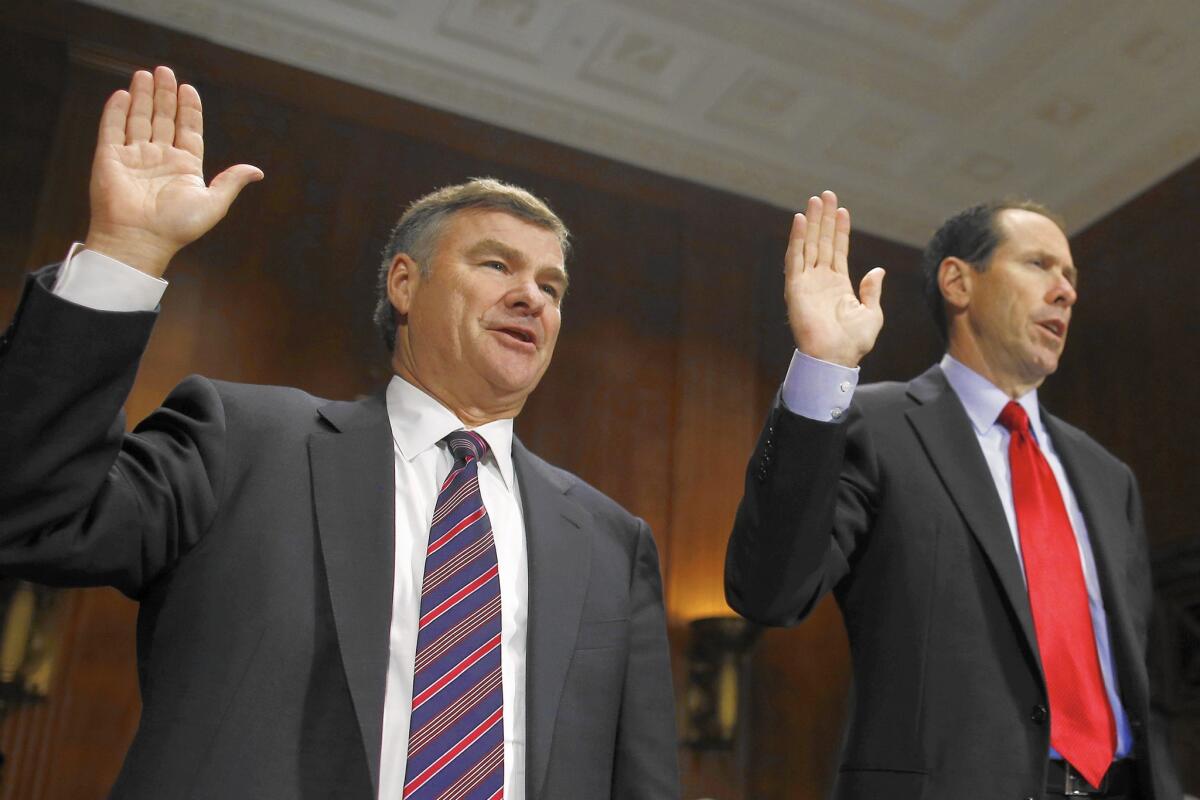Firms should stop pretending that high-profile mergers will benefit consumers

The script has become a familiar one for consumers.
First a company announces that it’s acquiring a rival firm. Both businesses declare this will be great for customers.
Federal regulators, in most cases, then say that they’ve looked closely at the deal and don’t see any problem.
The buyout goes through and — what do you know? — prices eventually go up and the quality of the product or service shows no improvement.
It makes you wonder: Has there ever been a high-profile merger that’s resulted in lower prices or higher quality for consumers?
In the wake of several big deals in recent days, I put that question to dozens of business professors, economists and lawyers specializing in mergers and antitrust issues. These are people who study and track this sort of thing for a living.
Not one was able to cite a single big-ticket merger that irrefutably benefited consumers in a long-term, demonstrable way.
Not one.
“Mergers typically mean less choice and benefits that never come about,” said David Balto, a Washington antitrust lawyer and former policy director for the Federal Trade Commission. “For the consumer, they’re usually about unfulfilled promises.”
On Monday, Israel’s Teva Pharmaceutical Industries, a leading maker of generic drugs, said it’s buying Allergan’s generic drug unit. Meanwhile, health insurer Anthem is buying rival Cigna, creating the country’s biggest health-insurance company.
And last week, federal officials gave their blessing to AT&T acquiring satellite provider DirecTV, making AT&T the nation’s largest pay-TV company.
In each of these cases, the companies involved are hailing their respective deals as a bright new day for consumers.
“Combining DirecTV with AT&T is all about giving customers more choices for great video entertainment integrated with mobile and high-speed Internet service,” said Randall Stephenson, AT&T’s chief executive. “We’ll now be able to meet consumers’ future entertainment preferences.”
John Swedish, Anthem’s chief executive, sounded a similar note in saying his company’s purchase of Cigna would provide “enhanced affordability” and “superior innovations that deliver a high-quality healthcare experience for consumers.”
Teva CEO Erez Vigodman said his company’s purchase of Allergan’s generic-drug division would improve “the health of people around the world.”
The reality, of course, is that in each of these markets there will now be less competition and, thus, greater opportunity for the companies involved to boost prices. There also will be less incentive to improve quality or innovate.
To be sure, not all mergers are to consumers’ detriment.
Moviegoers didn’t suffer when Disney bought Pixar. Google’s acquisition of YouTube, and Facebook’s purchase of Instagram, didn’t appear to weaken those free online services.
But these are examples of deals that weren’t intended to squeeze more revenue from customers through greater market power. Rather, they involved creation of new opportunities for growth.
John Kwoka, an economist at Northeastern University, said some small-scale mergers do result in modestly lower consumer prices, “but that’s a distinct minority.” Among high-profile deals, he said, it’s difficult to find evidence that consumers enjoyed any of the benefits pledged by companies.
Gerry McNamara, a management professor at Michigan State University, said sometimes consumers benefit in the form of greater convenience, such as airline mergers providing greater travel options for passengers.
But he and other experts said the danger of “large mega-mergers” comes in the form of increased market power for a dwindling number of heavyweight players.
SIGN UP for the free California Inc. business newsletter >>
The airline industry, for example, is enjoying record profit thanks primarily to significantly lower fuel costs. But ticket prices continue to rise, as do fees for almost everything, including checked bags and getting an assigned seat.
When companies merge, federal authorities aren’t tasked with making them live up to their rosy promises of consumer benefits. Instead, officials focus almost exclusively on the potential for harm.
“Regulators typically use concentration or market share as a proxy for ‘harm’ to competition and, by extension, to consumers,” said Ira Harris, an associate professor at the University of Virginia’s McIntire School of Commerce.
“This approach of course does not necessarily mean that consumers are better off because of the deal,” he said. “Just not obviously harmed.”
Sometimes the prospect of harm is so great that regulators make clear they’ll lower the boom. That’s why Comcast walked away from a buyout of Time Warner Cable, and why AT&T dropped its bid for T-Mobile.
More often than not, however, the likelihood of consumer harm isn’t readily apparent, so the deal goes through.
Back to my original question: Have there been any high-profile mergers that resulted in lower prices for consumers or higher quality?
“I’m not aware of a high-profile merger that resulted in lower prices or higher quality,” answered Michael Carrier, a law professor at Rutgers University, echoing the response I got from every expert I contacted.
So, please, big companies, stop pretending that we’re all winners here. The facts aren’t on your side.
David Lazarus’ column runs Tuesdays and Fridays. he also can be seen daily on KTLA-TV Channel 5 and followed on Twitter @Davidlaz. Send your tips or feedback to david.lazarus@latimes.com.
MORE FROM LAZARUS:
How to build, or rebuild, credit
Cutting the cable cord and embracing a digital media world
CVS takes high road in clash with business group
More to Read
Inside the business of entertainment
The Wide Shot brings you news, analysis and insights on everything from streaming wars to production — and what it all means for the future.
You may occasionally receive promotional content from the Los Angeles Times.











